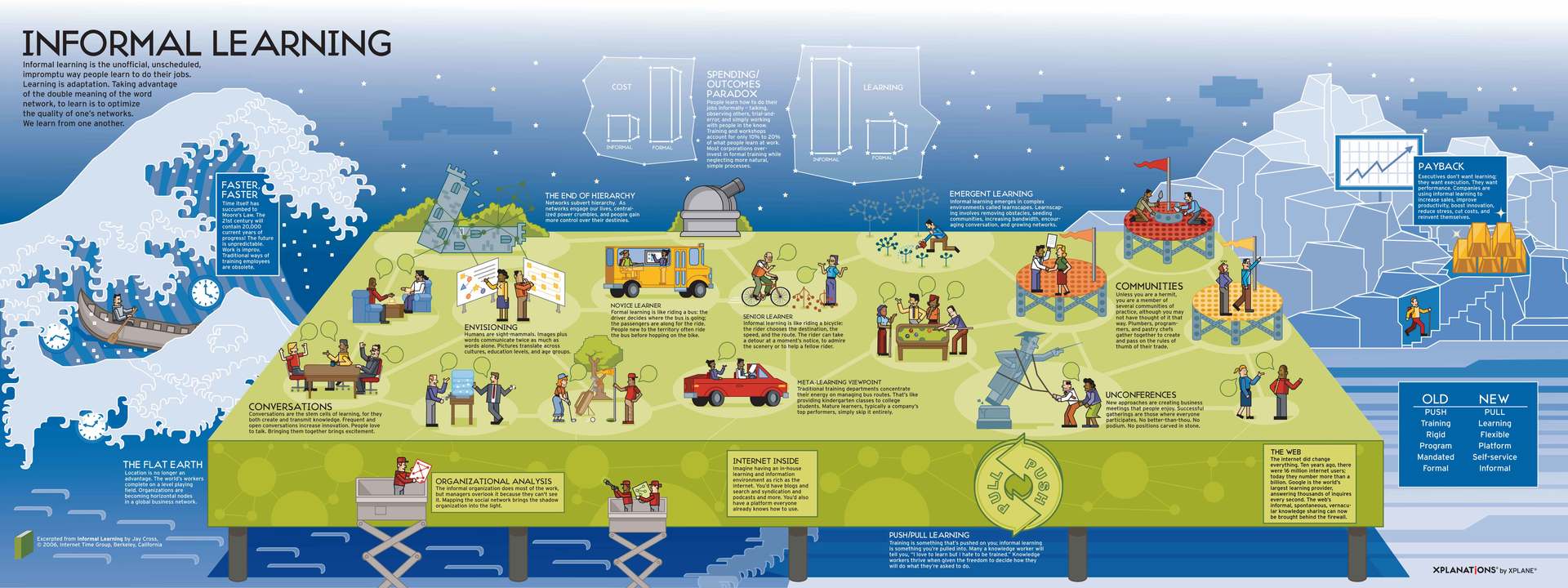How To Use Informal Learning Activities For Your eLearning Course
Informal learning is a bit of a catch-all term. It has been used as an umbrella term to describe a myriad of learning events but, in general, it refers to learning that exists outside a formal educational curriculum. We have long understood that learning can happen and generate better long-term outcomes in everyday informal ways. Consider, for example, learning to replace the filter in a coffee machine simply by observing another employee. This relatively simple task might not require formal training, and its completion can effectively be spread by simple observation.
It is easy to imagine how simple tasks might not always require formal training. In fact, some tasks suffer when training becomes overly formal for the expected behavior. Other tasks may prove exactly the opposite, that without formal training they are almost impossible to master. Sometimes we formalize training because we want to chronicle and expedite learning. For example, it might be viable to learn to "mop the floors" by mimicking the methods of those we see around us. But, it also might be problematic for a variety of reasons. Perhaps certain floors require specific chemical cleaners or must be mopped only at certain times, under certain conditions, or in a specific sequence. Figuring out when informal learning is sufficient for a given task, determining what actually qualifies as informal learning, and documenting the completion of "formal learning" are all actions that have a negating power on the informality of formal learning, but there are a lot of times when that is, in fact, the desire.
1. Mentoring
Mentoring is the most common occasion for this push/pull relationship between formal and informal learning to rear its ugly head. We know both anecdotally and through years of observation that a solid mentor can provide an amazing head start and guide for new employees. But how do we keep track of the quality of that mentoring? If that interaction is genuinely informal, then won’t the mentee be subject to substantial knowledge gaps as the mentor would simply offer advice and support as needed, rather than proactively providing information that might otherwise be very necessary for the mentee to do their job effectively?
How effective is an approach to training that relies on the learner first having a problem, and then needing to seek advice to solve that problem, rather than one that allows the learner to simply prevent the problem in the first place? Results for these informal training opportunities will vary, and it can be very difficult to understand where gaps might occur.
2. Job Aids
One potential resolution of those gaps is to provide guidance for informal learning in the form of knowledge bases and lists of common questions/lessons. These job aids can be drawn from a common repository and can be made available as supplemental learning tools, rather than formal assessments. Mentors can be encouraged to guide learners to such repositories as a supplement to their informal huddles and conversations. Many modern LMS solutions offer job aid libraries. While these repositories typically don’t aim to evaluate the engagement of individuals with the assets, they do provide a common outlet for monitoring downloads that can give some indication about the need for supplements in various areas.
Learners can also be encouraged to document their own journeys, and even contribute to the success of those who join the team after them by leaving behind their own "learning journey" tips and tricks. Often the voices of those who have just encountered challenges are more relevant and useful for new learners, as experts are often so experienced that it is difficult for them to teach all the appropriate steps it takes to get from the beginning of a challenge to the end. We often see this problem first hand when we ask an expert to explain something complex, and they provide esoteric or abstract answers rather than starting with precise definitions. It is important to provide simple, actionable steps during the early stages of learning new processes and procedures. This is a task better defined by those with a simpler understanding of the matter.
3. Social Learning Spaces
Like the water coolers of legend, social learning spaces provide modern learners with an opportunity to inquire, listen, lurk, socialize and relax. This kind of environment is conducive to informal learning because it is less threatening than the more formal spaces in the workplace. Many people are shy about asking questions. They don’t want to feel stupid and would much rather try to solve some problems for themselves. A great example is the loaded landscape of acronyms so common in many corporate cultures. Asking for the definition of a term or an acronym carries with the question the statement, "I’m new and I don’t know this. Can you explain Y.A.B.O?"
Finding an archive where someone has already endured the humiliation of an obvious answer or where a learner feels safe enough to ask the question can make mastering the office significantly easier. Your learners ramp up faster, and they are far less likely to become attrition statistics. Some modern LMS solutions include social learning/discussion forums, and even video and audio recording options to allow people to share ideas, ask questions, and get to know more about the work and the workplace.
Training situations don’t have to involve a classroom or structured chapters. You can turn many casual interactions into teaching moments. And sometimes, these informal training scenarios have more staying power in the learner’s mind. Examples include online training forums, peer-based coaching, social media groups, and impromptu live events. Check in with each other to make sure everyone participates and has the right tools, such as mobile social networking apps and an informal learning LMS. You can even incorporate gamification using your informal learning LMS to boost motivation.
You need a Learning Management System that supports informal training and social learning experiences to tap into in-house talent. Adobe Captivate Prime checks all these boxes and allows your employees to access content on any device. You can also track all your training initiatives, whether they’re offline, online, or external.








